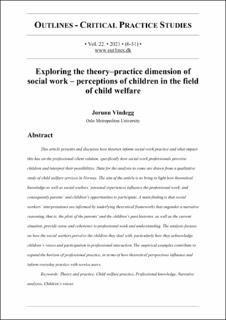Exploring the theory-practice dimension of social work- perceptions of children in the field of child welfare
Peer reviewed, Journal article
Published version
Permanent lenke
https://hdl.handle.net/11250/2986330Utgivelsesdato
2021-12-23Metadata
Vis full innførselSamlinger
- Publikasjoner fra Cristin [3269]
- SAM - Institutt for sosialfag [471]
Originalversjon
Outlines : Critical Social Studies. 2021, 22 (1), 6-31. https://doi.org/10.7146/ocps.v22i1.127156Sammendrag
This article presents and discusses how theories inform social work practice and what impact this has on the professional-client relation, specifically how social work professionals perceive children and interpret their possibilities. Data for the analysis to come are drawn from a qualitative study of child welfare services in Norway. The aim of the article is to bring to light how theoretical knowledge as well as social workers´ personal experiences influence the professional work, and consequently parents´ and children’s opportunities to participate. A main finding is that social workers´ interpretations are informed by underlying theoretical frameworks that engender a narrative reasoning, that is, the plots of the parents’ and the children’s past histories, as well as the current situation, provide sense and coherence to professional work and understanding. The analysis focuses on how the social workers perceive the children they deal with, particularly how they acknowledge children´s voices and participation in professional interaction. The empirical examples contribute to expand the horizon of professional practice, in terms of how theoretical perspectives influence and inform everyday practice with service users.
